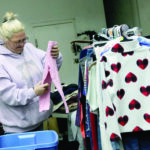Drake Thomas: Jekyll at school, Hyde at home — Navigating the school-home behavior disconnect

You’ve heard it a million times — a teacher bolsters your child’s behavior at school.
They consistently clip off the chart for good behavior, are the teacher’s helper, and even receive awards for their positive behavior. Their teacher reminds you what a joy they are to have in class.
And you have the thought you have had a million times — “ Are you sure? Because at home…” On one hand, you are thrilled that your child is performing so appropriately in the school setting, and on the other hand, it can be downright infuriating that as soon as they get home, the once star pupil has reverted into something akin to when Billy fed his Gremlins after midnight.
You can almost see it happen. The wheels start to turn. They lash out. They say things they don’t mean. They melt down and tend to take the whole household with them on the descent to madness. How can your child be so well-behaved for their teacher and other adults, and go completely pearshaped the minute they cross the threshold to your home?
After all, you’re the one who feeds them, clothes them, and tucks them in every night. If anything, it should be the other way around. As strange as it may seem if your child exhibits this behavior, it is the trademark of a healthy home life.
When you stop and take the time to compare school regiment to school regiment, the structure of both, even in the most structured homes, are vastly different. In a school setting a child recognizes they are one of many students. It is a natural behavior to pick up on the social cues of those around them and to very quickly assimilate to the classroom environment.
Though students may be completely comfortable with their teacher and classmates, there is always a level of guardedness that students experience at school.
Think of it like this; even if you have a superb relationship with your boss and coworkers, would you truly be comfortable with going to work and being around them in your pajamas and night guard? Would you perform your best if you were as comfortable at work as you were in your home setting?
Of course not. The expectation and mere presence of others is enough for us to guard ourselves, which in turn produces some of our best quality work.
Your child feels the same way about school. While they may be comfortable and genuinely happy in their classroom, they still know they are part of a group of peers within that setting. Students recognize that while the love and support of their teacher may not be conditional, their success within the classroom and in the social circle of their classroom hinges majorly on their behavior.
Children realize that peer relationships may not be successful if other students see them behaving poorly. It’s playground philosophy: “If you want to play with me, you have to be nice to me.”
However, children also realize that when they are home with their parents, love is unconditional. They feel completely safe and supported. They know without a shadow of a doubt that they can have meltdown after meltdown, and at the end of the night, their parents will still kiss them on the forehead as they head to bed and tell them that they love them.
Your child knows that within the walls of your home, it is okay to try — win, lose, or draw. They know that their safety net will be there to catch them, and you will be there to pick them up lovingly. You have instilled in your child that no matter how hard things may get, they know they can depend on you.
They know that when they set foot in their home, that place is safe, and the people there are safe. You have done your job as a parent. You have created a feeling of security and support within your home.
Your child trusts you enough to show you their hardest behavior knowing full well it has no bearing on your love for them.
So next time you watch your star pupil morph from Dr. Jekyll into Mr. Hyde as soon as they enter your car from the pickup line, remember that as hard as it may be on all involved, it goes to show how loved and supported they feel on their home turf. Keep up the good work!
Drake Thomas is a behavior intervention specialist at the Cassville school district and is a Cassville High School graduate. He may be reached at dthomas@ cassville.k12.mo.us.




